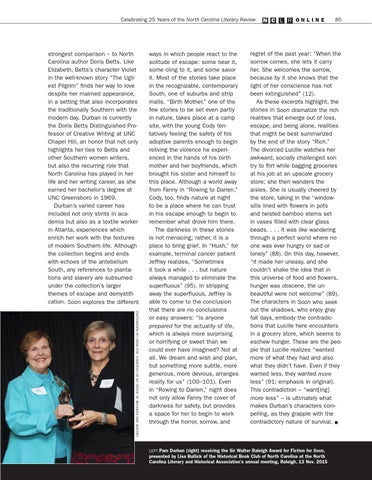Celebrating 25 Years of the North Carolina Literary Review
strongest comparison – to North Carolina author Doris Betts. Like Elizabeth, Betts’s character Violet in the well-known story “The Ugliest Pilgrim” finds her way to love despite her maimed appearance, in a setting that also incorporates the traditionally Southern with the modern day. Durban is currently the Doris Betts Distinguished Professor of Creative Writing at UNC Chapel Hill, an honor that not only highlights her ties to Betts and other Southern women writers, but also the recurring role that North Carolina has played in her life and her writing career, as she earned her bachelor’s degree at UNC Greensboro in 1969. Durban’s varied career has included not only stints in academia but also as a textile worker in Atlanta, experiences which enrich her work with the textures of modern Southern life. Although the collection begins and ends with echoes of the antebellum South, any references to plantations and slavery are subsumed under the collection’s larger themes of escape and demystification. Soon explores the different PHOTOGRAPH BY LINDA FOX; COURTESY OF NC OFFICE OF ARCHIVES AND HISTORY
ways in which people react to the solitude of escape: some bear it, some cling to it, and some savor it. Most of the stories take place in the recognizable, contemporary South, one of suburbs and strip malls. “Birth Mother,” one of the few stories to be set even partly in nature, takes place at a camp site, with the young Cody tentatively feeling the safety of his adoptive parents enough to begin reliving the violence he experienced in the hands of his birth mother and her boyfriends, which brought his sister and himself to this place. Although a world away from Fanny in “Rowing to Darien,” Cody, too, finds nature at night to be a place where he can trust in his escape enough to begin to remember what drove him there. The darkness in these stories is not menacing; rather, it is a place to bring grief. In “Hush,” for example, terminal cancer patient Jeffrey realizes, “Sometimes it took a while . . . but nature always managed to eliminate the superfluous” (95). In stripping away the superfluous, Jeffrey is able to come to the conclusion that there are no conclusions or easy answers: “Is anyone prepared for the actuality of life, which is always more surprising or horrifying or sweet than we could ever have imagined? Not at all. We dream and wish and plan, but something more subtle, more generous, more devious, arranges reality for us” (100–101). Even in “Rowing to Darien,” night does not only allow Fanny the cover of darkness for safety, but provides a space for her to begin to work through the horror, sorrow, and
N C L R ONLINE
85
regret of the past year: “When the sorrow comes, she lets it carry her. She welcomes the sorrow, because by it she knows that the light of her conscience has not been extinguished” (12). As these excerpts highlight, the stories in Soon dramatize the rich realities that emerge out of loss, escape, and being alone, realities that might be best summarized by the end of the story “Rich.” The divorced Lucille watches her awkward, socially challenged son try to flirt while bagging groceries at his job at an upscale grocery store; she then wanders the aisles. She is usually cheered by the store, taking in the “windowsills lined with flowers in pots and twisted bamboo stems set in vases filled with clear glass beads. . . . It was like wandering through a perfect world where no one was ever hungry or sad or lonely” (88). On this day, however, “it made her uneasy, and she couldn’t shake the idea that in this universe of food and flowers, hunger was obscene, the unbeautiful were not welcome” (89). The characters in Soon who seek out the shadows, who enjoy gray fall days, embody the contradictions that Lucille here encounters in a grocery store, which seems to eschew hunger. These are the people that Lucille realizes “wanted more of what they had and also what they didn’t have. Even if they wanted less, they wanted more less” (91; emphasis in original). This contradiction – “want[ing] more less” – is ultimately what makes Durban’s characters compelling, as they grapple with the contradictory nature of survival. n
LEFT Pam Durban (right) receiving the Sir Walter Raleigh Award for Fiction for Soon,
presented by Lisa Bullick of the Historical Book Club of North Carolina at the North Carolina Literary and Historical Association’s annual meeting, Raleigh, 13 Nov. 2015
